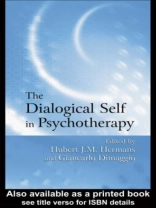How can a theory of the self be used to understand the psychotherapeutic process? The basic assumption of the ‘dialogical self’ is that there is no centralised ‘headquarter’ in the mind, but that the internal self is made up of a number of different ‘characters’. Interpersonal relationships, from infancy onwards, become internalised – these internalised relationships then influence relationships during life. The Dialogical Self in Psychotherapy is divided into four clear and accessible sections, which explore: * theoretical and historical assumptions of the dialogical self from different angles: psychological, developmental and neurobiological* the relationships between Dialogical Self Therapy and the authors’ own theoretical perspectives* treatment of clients suffering from severe disorders* method and research. The Dialogical Self in Psychotherapy gathers together psychotherapists from divergent origins to explore current thinking in the field: cognitive, constructivist, process-experiential, narrative, psychodynamic, psychodramatic, humanistic, and cognitive analytic. This innovative book brings together inter- and intra-subjective dialogue and clearly demonstrates how they are incorporated into the therapeutic process.
Giancarlo Dimaggio & Hubert J.M. Hermans
Dialogical Self in Psychotherapy [PDF ebook]
An Introduction
Dialogical Self in Psychotherapy [PDF ebook]
An Introduction
Buy this ebook and get 1 more FREE!
Language English ● Format PDF ● Pages 296 ● ISBN 9781135446550 ● Editor Giancarlo Dimaggio & Hubert J.M. Hermans ● Publisher Taylor and Francis ● Published 2004 ● Downloadable 3 times ● Currency EUR ● ID 4328274 ● Copy protection Adobe DRM
Requires a DRM capable ebook reader












